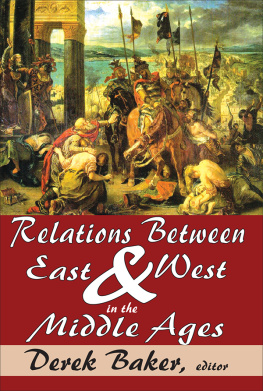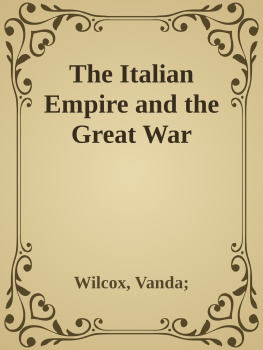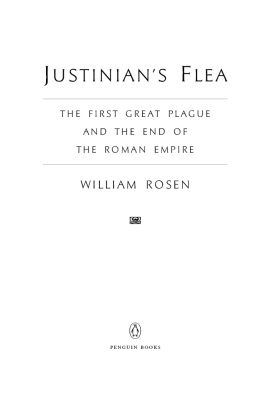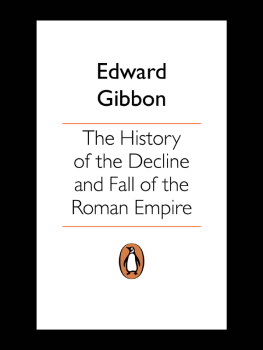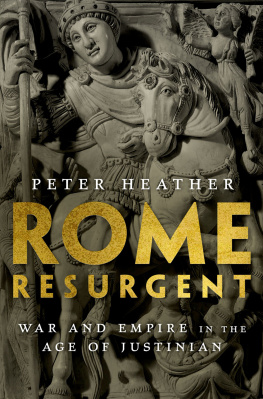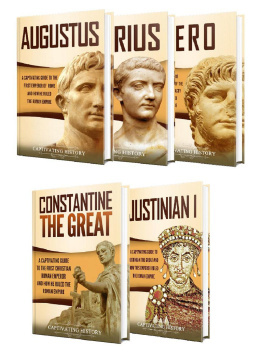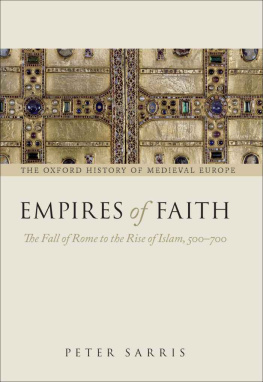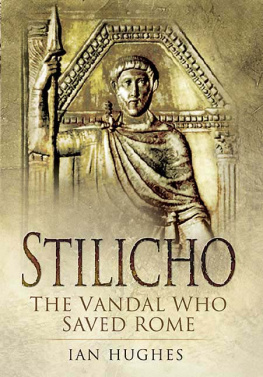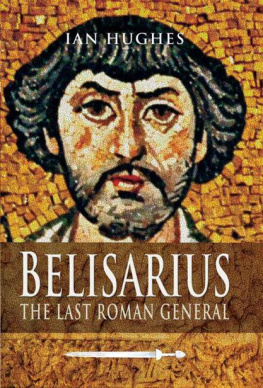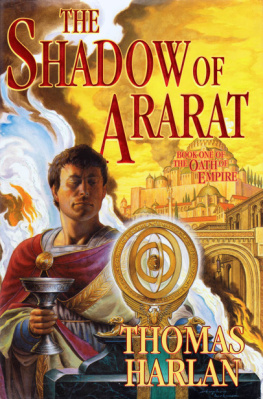
THE DIGEST OF ROMAN LAW
ADVISORY EDITOR: BETTY RADICE
F LAVIUS P ETRUS S ABBATIUS I USTINIANUS was Roman Emperor of the East, A.D . 52765, having first ruled jointly with his elderly uncle the Emperor Justin from 518 to 527. He had a strong sense of his imperial rank and mission. In the East he held Persia in check by a war fought in Syria and Mesopotamia, 52732, and by further campaigns from 540 onwards. In the Balkans he dealt successfully with a succession of threats from barbarian invaders. At home, his rule was shaken in 532 by the famous Nike riots, which he finally quelled in blood. It was in the West, however, that Justinians ambitions were made clear with his determination to reassert forcibly the majesty and control of the Empire. In campaigns fought in Africa and Italy through the great general Belisarius, he was able to largely recover the Western Empire by the year 540. Justinians excessive financial administration resulted in the heavy indebtedness of the state. Nevertheless, as befitted his grand conception of this office, he built on a lavish scale; the Church of Hagia Sophia in Constantinople being his greatest monument. Vexed by the Monophysite heresy, he determined to impose peace on the Church and found a formula for unity at the Council of Chalcedon. His supreme achievement, however, was the great codification of Roman law (the Digest, Institutes and Novellae). His long reign ended in darkness, with storms gathering and the Empire ravaged by plague.
C OLIN K OLBERT was educated in the Classics at Queen Elizabeths, Barnet, and in the Law at St Catharines College, Cambridge (where he completed his Ph.D.), and Lincolns Inn (where he was called to the Bar). He has held university lectureships at Oxford, where he was Fellow and Tutor in Jurisprudence at St Peters College, and at Cambridge, where he was Fellow, Tutor and Director of Studies at Magdalene College. His recent publications include works on English, Scots and Irish land law and African customary land tenures. He also writes on music. He is now a Circuit Judge and an Emeritus Fellow of Magdalene College, Cambridge.
JUSTINIAN

THE DIGEST OF ROMAN LAW
THEFT, RAPINE, DAMAGE AND INSULT

TRANSLATED BY C . F . KOLBERT
PENGUIN BOOKS
PENGUIN BOOKS
Published by the Penguin Group
Penguin Books Ltd, 80 Strand, London WC2R 0RL, England
Penguin Putnam Inc., 375 Hudson Street, New York, New York 10014, USA
Penguin Books Australia Ltd, 250 Camberwell Road, Camberwell, Victoria 3124, Australia
Penguin Books Canada Ltd, 10 Alcorn Avenue, Toronto, Ontario, Canada, M4V 3B2
Penguin Books India (P) Ltd, 11 Community Centre, Panchsheel Park, New Delhi 110 017, India
Penguin Books (NZ) Ltd, Cnr Rosedale and Airborne Roads, Albany, Auckland, New Zealand
Penguin Books (South Africa) (Pty) Ltd, 24 Sturdee Avenue, Rosebank 2196, South Africa
Penguin Books Ltd, Registered Offices: 80 Strand, London, WC2R 0RL, England
www.penguin.com
This translation first published 1979
Copyright C. F. Kolbert, 1979
All rights reserved
Except in the United States of America, this book is sold subject to the condition that it shall not, by way of trade or otherwise, be lent, re-sold, hired out, or otherwise circulated without the publishers prior consent in any form of binding or cover other than that in which it is published and without a similar condition including this condition being imposed on the subsequent purchaser
ISBN: 978-0-14-196136-1
CONTENTS

GENERAL INTRODUCTION

T HE civil law of Rome in its developed form as it has come down to us is undoubtedly one of the greatest achievements of the human mind and spirit. After so many centuries of so-called civilization, progress and culture it is well for twentieth-century man, taking for granted, as he does, that among the plethora of things which the state will provide for him is a system of law which he supposes will ensure justice, and regulate society, to reflect that he owes directly to the Romans the very existence of a theory of such a thing as law. Had that theoretical base not been brought into existence, present-day lifestyles would be unlikely to exist either. The Romans were the first to regard law as a science by means of which they could look at the world, with all its people and property and their intermingling relationships, through juridical concepts every bit as orderly as the concepts used by, say, mathematicians and physicists for their particular observations. European lawyers in particular (the English Channel was largely responsible for a different development in the British Isles the common law rather than the civil law of Rome) have kept alive many of the basic notions of the ancient Roman law as a basis for their present juridical systems. It was not so much the technical apparatus of the Roman law which proved of such value to them, but its clarity, simplicity and orderliness which have allowed this long and continuous development to take place.
The story is of course a long one the Emperor Justinian, who brought the ancient law to its finest flowering, died in
It is no exaggeration to say that, next to the Bible, no book has left a deeper mark upon the history of mankind than the Corpus Iuris Civilis. Much has been written about the impact of Rome upon Western civilization. Much has been disputed about the ghost of the Roman Empire that still lurks far beyond the shores of the Mediterranean. The heritage of Roman law is not a ghost but a living reality. It is present in the court as well as in the market-place. It lives on not only in the institutions but even in the language of all civilized nations.
To the pessimist or the sceptic, who too readily accepts the view that ideologies are nothing but a superstructure of facts, the history of that heritage is a reminder of the predominance of the spiritual over the material factor. The history of Roman Law during the Middle Ages testifies to the latent vigour and organizing power of ideas in the midst of shifting surroundings [Vinogradoff; cf. the duck idea, above]. The revival of Roman Law was a powerful leaven in the transformation of the social and political structure of Europe. Those who speak of a damnosa hereditas have their eye only on one side of the picture. They overlook what is our greatest debt to the Roman inheritance: the notion that law is the common patrimony of men, a bond that can overcome their differences and enhance their unity.
Before any evaluation of the place of Roman law in the life of the Roman people and its effects on modern law can be attempted or any verdict passed on the achievement of Justinian, a brief outline will have to be given of the development of the Roman law and the sources from which it was drawn. No system of law can be understood without some knowledge of the history of the society for whose use it was evolved and whose relationships it was intended to regulate. The various standard histories of Rome give detailed accounts of the political and social evolution of the Roman state, of its internal politics and its civil and external wars; many of them also attempt to give some cultural background by reference to Latin literature and Roman building, but it is remarkable that scarcely any of them make more than passing reference to that vital ingredient upon which the much-vaunted Roman administration depended, the Roman law. This is no place to embark upon any sort of general history of Rome, but since even that diminishing number of people who nowadays study ancient history are unlikely to have made acquaintance with Roman legal history, what follows is an attempt to sketch, albeit briefly, the main features of the development of that law so that it may be set into its context against the more familiar history of events in general. Above all it is vital to bear in mind, because of the foreshortening or telescoping effect of looking back upon events far in the past, that the Corpus Iuris Civilis of Justinian, which was completed in A.D . 534, came at the end of a development of laws which had spread over thirteen centuries. English land law is thought to have a long history: indeed it is on this account that it has acquired much of its complexity. Some of its basic notions literally came with the Conqueror; Edward I made far-reaching reforms in statutes which directly affect every conveyance made today, and the extent of legal memory, whereof the mind of man runneth not to the contrary, was set at 1189. How long ago we think the Conquest was! After all, we recently celebrated its ninth centenary; and Edward Is statutes will soon be seven hundred years old. Were Justinian embarking upon his


